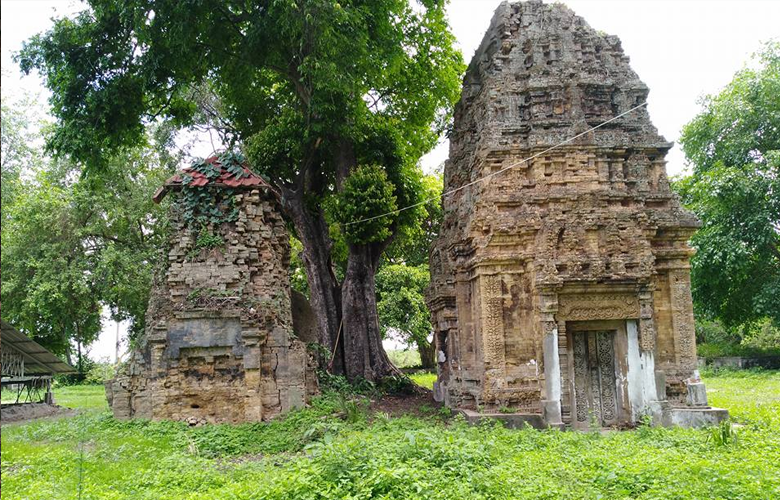
រមណីយដ្ឋានភ្នំដោះក្រមុំ
-
 By
Local-guide N003
By
Local-guide N003
- Date 15 Feb 2024
រមណីយដ្ឋានភ្នំដោះក្រមុំ គឺជាបូជនីយដ្ឋានទេសចរណ៍មួយនៅក្នុងខេត្តមណ្ឌលគិរីដែលជនជាតិភាគតិច រមែងធ្វើការគោរពបូជាតាមជំនឿទំនៀមទម្លាប់របស់ពួកគេ ។ រមណីយដ្ឋាននេះស្ថិតនៅក្រុងសែនមនោរម្យទីរួមខេត្តមណ្ឌលគីរី ហើយទីនេះក៏ ត្រូវបានអ្នកជំនាញផ្នែកវប្បធម៌ គ្រោងដាក់បញ្ចូលជាសម្បត្តិបេតិកភណ្ឌជាតិ និងបេតិកភណ្ឌពិភពលោកនៅថ្ងៃខាងមុខ។ តំបន់នេះ មានចំណុចពិសេសច្រើន ដូចជាទីតាំងនៅក្នុងក្រុង ប្រមូលផ្ដុំដោយជំនឿជនជាតិដើមភាគតិចមានការឲ្យតម្លៃពីជនបរទេស និងព្រះមហាក្សត្រខ្មែរ ពិសេសជាទីតាំងកុលសម្ព័ន្ធប្រវត្តិសាស្ត្រ របស់ជនជាតិដើមភាគតិច ហើយនៅទីនេះក៏ជាកន្លែងអំណោយផលបំផុតសម្រាប់ការថតរូប និងមើលថ្ងៃរៀបលិច។
Read More

ប្រាសាទកំពង់ព្រះ
-
 By
Local-guide N003
By
Local-guide N003
- Date 15 Feb 2024
ប្រាសាទកំពង់ព្រះ ស្ថិតនៅក្នុងភូមិកំពង់ព្រះ ឃុំឆ្នុកទ្រូ ស្រុកបរិបូណ៍ ខេត្តកំពង់ឆ្នាំង។ ភ្ញៀវទេសចរអាចធ្វើដំណើរឆ្លងកាត់ក្រុងកំពង់ឆ្នាំង តាមដង ផ្លូវជាតិលេខ ៥ និងផ្លូវក្រាលកៅស៊ូដែលមានចម្ងាយប្រមាណ ៤៤ គីឡូម៉ែត្រ។ ហើយទីនេះជា ទីទួលមួយក្នុងបរិវេណវត្តកំពង់ព្រះ ដែលពីបូរាណកាលមកគេតែងហៅតៗគ្នាថាៈ វត្តទួលព្រះស្រីពិជ័យសូរវង្សកំពង់ព្រះនៅទីនោះគេឃើញមានប្រាសាទចំនួន ពីរគឺ ប្រាសាទស្រី និងប្រាសាទប្រុសហើយនៅក្បែរអណ្តូងភ្ញៀវទេសចរ នឹងឃើញមានទម្រលឹង្គមួយ ដែលធ្វើពីថ្មមានគន្លាក់ដំណាប់តាមប្រភេទលឹង្គ នាសម័យកសាងប្រាសាទនេះប្រហែលជានៅក្នុងចន្លោះសតវត្សទី ៧-៨ ដែលបុព្វបុរសយើងបានធ្វើសម្រាប់ឧទ្ទិស ចំពោះលិទ្ធិទេវរាជតាមបែបព្រហ្មញ្ញសាសនា។ (ប្រាសាទនេះបានបែមុខទៅទិសខាងជើង)។
Read More

ប្រាសាទព្រះខ័ន (Preah Kang temple)
-
 By
Local-guide N003
By
Local-guide N003
- Date 13 Feb 2024
ប្រាសាទព្រះខ័នស្ថិតនៅតាមផ្លូវវង់ធំដោយចេញតាមផ្លូវទ្វារដីឆ្នាំង នៃអង្គរធំ។ប្រាសាទកសាងឡេីងនៅសតវត្សរទី១២ក្នុងឆាំង១១៩១ដោយព្រះបាទជ័យវ្មរ័នទី៧ ឧទ្ទិសដល់បិតាព្រះអង្គ។ទីអារាមនេះមានទំហំ៥៤ហិចតា។តាមសិលាចារិកថា ប្រាសាទនេះសាងសង់នៅសមរភូមិចុងក្រោម ដែលព្រះបាទជ័យរវ្ម័នទី៧ ផ្តួលរំលំពួកចាម ប្រាសាទនេះមានកំពែងបួនជាន់។នៅកំពែងខាងក្រៅដែលបច្ចុប្បន្នរំុព័ទ្ធ ដោយព្រៃគឺជាកន្លែងដែលព្រះសង្ឃនិងសិស្សស្នាក់នៅ នៅប្រាសាទ។ប្រាសាទនេះ។នៅកំពែងជាន់ទី២គឺជាកន្លែងគោរពសាសនា ឯភាគខាងជេីងនិងខាងលិច គឺសម្រាប់ឧទ្ទិសដល់ព្រហ្មមញ្ញសាសនាគឺព្រះវិស្ណុ(លិច)និងព្រះឥសូត(ជេីង)នៅផ្នែកខាងត្បូងជាកន្លែងសម្រាប់គោរពបុព្វជនកន្លែងមួយដែលស្ថិតនៅខាងកេីតជិតប្រាសាទព្រះខ័នហៅថាវាលរាជដាក ឬព្រះរាជាដាក។វាលនេះមានបណ្តោយ១៥០០ម និងទទឹង១២០០ម។នៅចម្ងាយប្រហែល៧០០ម ខាងជេីងប្រាសាទព្រះខ័នតាមផ្លូវទៅស្រុកអង្គរធំ។មានប្រាសាទសង់ពីថ្មបាយក្រៀមមានឈ្មោះថា ប្រាសាទផ្ទុរ ។
Preah Kang temple is located 2 kilometers north-east of Angkor Thom on the Grand Circuit. The temple was built in the second half of the 12 century in AD 1191 by King Jayavarman 7, dedicated to his father Dharanindravarman. The Buddhist complex covers 56 hectares and serves as the nucleus of the group that includes Neak Pean and Ta Som, located 4 kilometers long Jayatataka Barry last of the great reservations to be built in Angkor. The inscription indicates that Preah Khan was built on the battle site where King Jayavarman 7 finally defeated the Chams. In those days it was known as Nagarajayacri which means the city of Preah Khan. Four concentric ramparts subdivide Preah Khan. The outer of the fourth wall, which is encircled by a wide moat, today encloses a large tract of jungle, formerly the living quarters of the monks, students, and attendants of Preah Khan. The second rampart delineated the principal religious compound of about four hectares within which there is a dense concentration of temples and shrines. The complex is Buddhist. The northern and western sectors are dedicated to Brahmanism-Vishnu(west) and Shiva (north), whilst the southern sector is a place of ancestor worship. The eastern sector forms the grand entrance to the central shrine. A place for a king located near Preah Khan temple is called Veal Reacheak or Preah Reachea Dak. It is 1,500 meters wide. Nearby about 700 meters north of Preah Khan temple along the road to Angkor Thom district is another small temple called Ptu. The temple was made of laterite.
Read More

ប្រាសាទអកយំ (Ak Yum temple)
-
 By
Local-guide N003
By
Local-guide N003
- Date 13 Feb 2024
ប្រាសាទអកយំស្ថិតនៅចុងផុតខាងត្បូងនៃបារាយណ៍ខាងលិច។ប្រាសាទនេះកសាងឡើងក្នុងរវាងសត្សរ៍ទី៧និងទី៩។សីលាលាចារិកដែលរកឃើញនៅលើសសរបញ្ជាក់ប្រាប់ពីការបរីច្ឆេទនៃប្រាសាទអកយមគឺ ឆ្នាំ៦០៩៧០៤និង១០០១។ ក្នុងពេលកសាងបារាយណ៍ខាងកើតផ្នែកខ្លះនៃប្រាសាទនេះត្រូវបានកប់ដោយទំនប់ខាងត្បូង។ ប្រសាតយនេះមានបីជាន់ មានប្រាង្គចំនួន១២ និងព័ទ្ធដោយជញ្ជាំងធ្វើពីឥដ្ឋ។
Ak Yum temple is located southern end of West Baray. The temple was built between 7 and 9 centuries. The inscriptions found on pillars give the date of AD 609, 704, and 1001 from Ak Yum temple. Evidence of a lingam and some sacred depository has also been found. During the construction of the West Baray, this site was partially buried by the south levee of the Baray. The temple was built on their level standing on the platform and enclosed by a brick with sandstone bays. Four shrines occupied the corners of the second tier and two others stood on each side, making a total of twelve shrines. The central sanctuary was on the uppermost tier and opened to the east with false doors on the other three sides. Post holes are still visible and were probably used to support a wooden framework for the monument.
Read More

ប្រាសាទលាក់នាង (Leak neang temple)
-
 By
Local-guide N003
By
Local-guide N003
- Date 13 Feb 2024
ប្រាសាទលាក់នាងមានទីតាំងស្ថិតនៅខាងកើតស្ទឹងសៀមរាបនៅខាងលិចប្រាសាទតាកែវនិងស្ពានថ្ម។ប្រាសាទនេះកសាងឡើងនៅចុងសតវត្សទី១២ដោយព្រះបាទជ័យវរ្ម័នទី៧។សិលាចារិកដែលរកឃើញនៅតំបន់នោះបញ្ជាក់ថាទីនេះគឺជាមន្ទីរពេទ្យទាំង១០២ដែលសាងសង់ឡើងដោយព្រះបាទជ័យវរ្ម័នទី៧។ប្រាសាទនេះធ្វើអំពីថ្មភក់បែរមុខទៅទិសខាងកើតមានរាងដូចប្រាសាទតាព្រហ្មកិលដែលនៅខាងលិចអង្គរវត្ត។
Read More
Showing 91 - 95 of 105 posts

